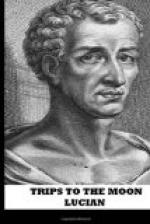We cast anchor and landed, leaving our ship in the harbour with Scintharus and two more of our companions. As we were walking through a meadow full of flowers, we met the guardians of the isle, who, immediately chaining us with manacles of roses, for these are their only fetters, conducted us to their king. From these we learned, on our journey, that this place was called the Island of the Blessed, {116a} and was governed by Rhadamanthus. We were carried before him, and he was sitting that day as judge to try some causes; ours was the fourth in order. The first was that of Ajax Telamonius, {116b} to determine whether he was to rank with the heroes or not. The accusation ran that he was mad, and had made an end of himself. Much was said on both sides. At length Rhadamanthus pronounced that he should be consigned to the care of Hippocrates, and go through a course of hellebore, after which he might be admitted to the Symposium. The second was a love affair, to decide whether Theseus or Menelaus should possess Helen in these regions; and the decree of Rhadamanthus was, that she should live with Menelaus, who had undergone so many difficulties and dangers for her; besides, that Theseus had other women, the Amazonian lady and the daughters of Minos. The third cause was a point of precedency between Alexander the son of Philip, and Hannibal the Carthaginian, which was given in favour of Alexander, who was placed on a throne next to the elder Cyrus, the Persian. Our cause came on the last. The king asked us how we dared to enter, alone as we were, into that sacred abode. We told him everything that had happened; he commanded us to retire, and consulted with the assessors concerning us. There were many in council with him, and amongst them Aristides, the just Athenian, and pursuant to his opinion it was determined that we should suffer the punishment of our bold curiosity after our deaths, but at present might remain in the island for a certain limited time, associate with the heroes, and then depart; this indulgence was not to exceed seven months.
At this instant our chains, if so they might be called, dropped off, and we were left at liberty to range over the city, and to partake of the feast of the blessed. The whole city was of gold, {118} and the walls of emerald; the seven gates were all made out of one trunk of the cinnamon-tree; the pavement, within the walls, of ivory; the temples of the gods were of beryl, and the great altars, on which they offered the hecatombs, all of one large amethyst. Round the city flowed a river of the most precious ointment, a hundred cubits in breadth, and deep enough to swim in; the baths are large houses of glass perfumed with cinnamon, and instead of water filled with warm dew. For clothes they wear spider’s webs, very fine, and of a purple colour. They have no bodies, but only the appearance of them, insensible to the touch, and without flesh, yet they stand, taste,




